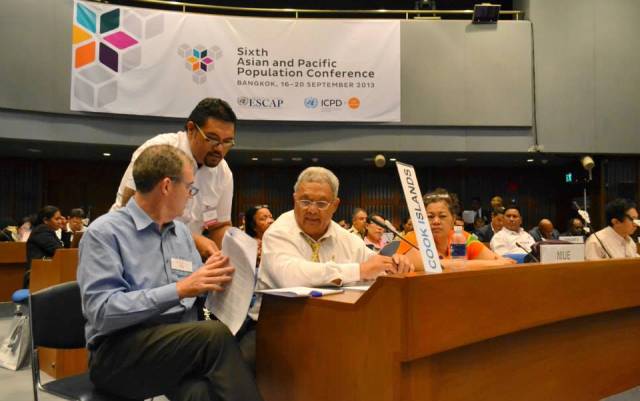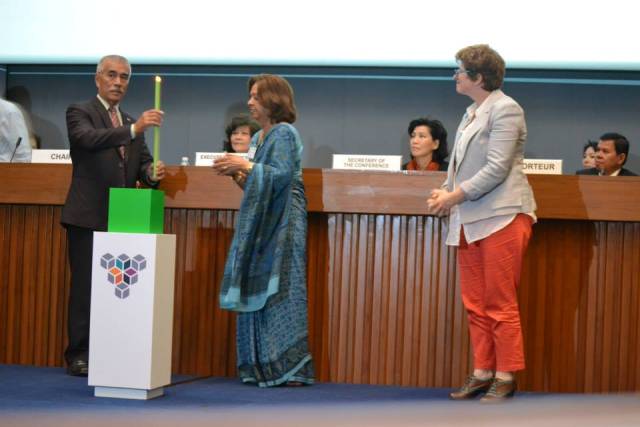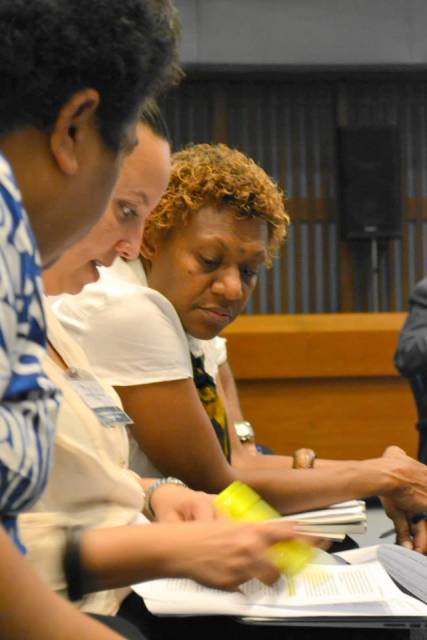September 26, 2013 (UNFPA Pacific) - The Asia Pacific region has adopted a document towards a global development agenda that will contribute to an updated agenda for the International Conference on Population and Development (ICPD) Programme of Action (PoA).
If ever there was an international meeting where Pacific island country delegations showed that the Pacific was a voice that mattered, that being isolated did not dampen their solidarity if they wanted to act as a bloc, it would have to be at the 6th Asian and the Pacific Population Conference (APPC) held in Bangkok last week, where regional priorities were adopted.
This was no mean feat when one considers that the issues were related to sexual and reproductive health and rights, and those that opposed their position for progressive development language in a renewed agenda beyond 2014 were some of the most highly influential countries on the global geopolitical front.
"The highest joy for me is how as, Pacific islands representatives, we have been able to unite ourselves with one voice, particularly in terms of looking at the two broad issues of population and development so I am very pleased with our members," Cook Islands Minister for Health Nandi Glassie who became the default spokesperson of the Pacific bloc said.
"I am very pleased with the sense of unity and the clear sense of direction for the benefit of all people of the Asian and Pacific region." Delegates adopted the declaration by a 38-3 vote with one abstention. A few Asian delegations recorded reservations on references in the agreement to "sexual rights" and "sexual orientation and gender identity."

The high-level regional intergovernmental conference issued a ringing affirmation that gender equality and sexual and reproductive health and rights are indispensable to sustainable development, and must be a key part of the post-2015 development framework.
Pacific delegations were part of some 500 representatives from 47 countries, with logistical and technical support staff from both UNFPA and the UN Economic and Social Commission for Asia and the Pacific (ESCAP), the agencies which co-organised the conference.
Every ten years, ESCAP hosts the APPC. The UNFPA on the other hand has been in the process of reviewing the ICPD PoA implementation at country and regional level as the ICPD PoA approaches the end of a 20-year programme cycle. From the various country and regional reviews, which included Pacific island nations, a consolidated development priority document will be submitted to next year's UN General Assembly review of the ICPD. The ICPD PoA was endorsed by 179 world leaders in Cairo in 1994.
The APPC Declaration reasserts key principles of the ICPD PoA, stressing States' responsibility to protect human rights for all without distinction and to address the root causes of poverty. It calls for universal and equitable access to sexual and reproductive health services, to further reduce maternal deaths, ensure access to rights-based family planning and prevent the spread of HIV.
There is a strong emphasis on promoting gender equality, including calls to end violence against women and girls and early and forced marriage.
Reflecting on the findings of a survey on countries' implementation of the PoA, the agreement also highlights actions essential to further progress. A central focus is on the rights of young people and their needs, including comprehensive sexuality education, access to contraception including for the unmarried, education and employment opportunities.
The Declaration calls for strengthening health and social protection systems that address the vulnerability to poverty and social isolation of older persons.

The Pacific delegation caused a ripple upon their arrival being a significant group representing 12 countries and numbering almost 40, comprising parliamentarians, ministers, senior state officials, non-governmental organisations and youth. The President of Kiribati, Anote Tong, had been invited to deliver the keynote address and chair the ministerial segment of the conference.
The ripple became a wave to be reckoned with when countries, like Iran and Russia, decided against text on comprehensive sexuality education. In 2012 alone, UNFPA Pacific had provided technical assistance to eight Pacific island countries for the review of their curricular to ensure that family life education, as it is more commonly known, would be holistic and include life skills.
The Pacific government delegations represented Niue, Tuvalu, Republic of the Marshall Islands, Federated States of Micronesia, Fiji, Tonga, Nauru, Cook Islands, Vanuatu, Solomon Islands, Samoa and Papua New Guinea; there were also youth representation and civil society.
In August, a Pacific meeting of parliamentarians on population and development had issued the Moana Declaration, which features 18 recommendations including the creation of an enabling environment to ensure access to sexual and reproductive health and rights for all people and without discrimination, the incorporation of sexual and reproductive health-related issues in development strategies, increased participation of women and young people in decision-making processes and the elimination of gender-based violence.
In her closing remarks, UNFPA Deputy Executive Director Kate Gilmore referred to the Moana Declaration as a pathway to the ultimate destination of development agendas and those who work in the (development) sector: the realization of everyone's "inherent inalienable human dignity of each of us, with the exception to none of us, for the sake of all of us".
"The Moana is not only a groundbreaking communiqué, it is an image and a construct represented by (the) ocean - we are all affirmed as being profoundly deeply inevitably and inextricably connected and it is these connections that we have been seeking to give text to," Ms Gilmore said.
"Our connections are not only material, they are people ... and it reminds us that no matter how much we may refine our text, our progress in these documents is not whether we have added more to the abundance of those who have much but it is whether we have provided enough for those who have the least."
Samoa's head of delegation Henry Tamotu Ah Ching said the Pacific had affirmed at the conference that it was an important voice in the Asia and Pacific region. As a staff from his country's Finance ministry, the conference he said, underlined for him the importance of ensuring population and development issues are considered in national planning processes.
Solomon Islands parliamentarian Douglas Ete said it was now dependent on a country's political will to institute or strengthen inclusive development strategies, in particular women's participation in political processes to ensure good governance.
Tuvalu head of delegation and Director of Health Dr Stephen Homasi was impressed with the way the Pacific representatives had conducted themselves, their unity in "upholding the aspirations of the Moana Declaration. "It is this togetherness and partnership and agreeing to the document itself that makes it really easy for us as a team to work together in achieving what we here for at this conference," Dr Steven said.
The humanity of population and development issues was, if anything, the recurring theme of the conference.
Former head of UNFPA, Special Advisor to the UN Secretary-General and Special Envoy for HIV/AIDS in Asia, Dr Nafis Sadik reminded delegates that women's continuing subjugation would only hold society back. Dr Sadik urged Asia and Pacific leaders to end gender discrimination; that the issue must become priority for action at both policy level and national life.
Dr Sadik said barriers to achieving social changes, can be, as has been in many instances, broken down.
"The real barriers to universal sexual and reproductive health and rights, women's empowerment and gender equality are not physical or institutional: they exist in people's minds," Dr Sadik said.


